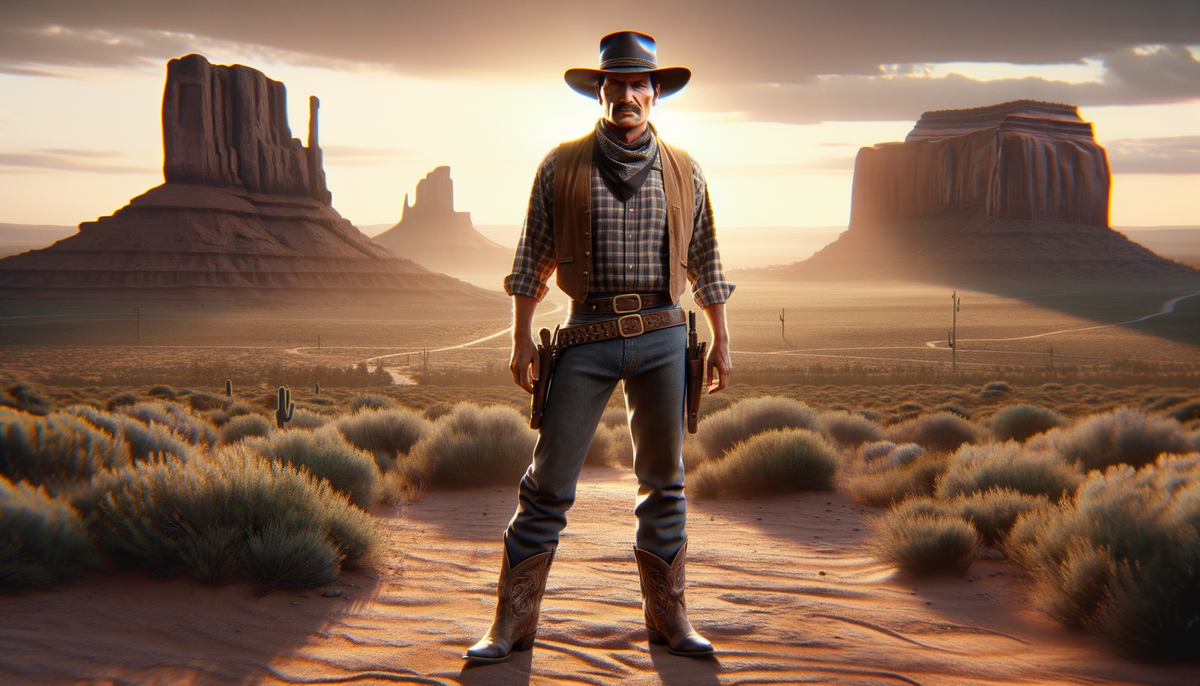John Wayne: Unpacking the Legend of Hollywood's Western Icon
Explore the enduring legacy of John Wayne, a Hollywood icon synonymous with the Western genre and American spirit.

John Wayne: Unpacking the Legend of Hollywood's Western Icon
In the vast landscape of Hollywood's illustrious history, few names evoke as much admiration and nostalgia as John Wayne. Known as 'Duke' to his friends and legion of fans, John Wayne's image is deeply etched into the American cultural psyche as the quintessential Western hero. This week, we dive deep into the legacy of John Wayne, exploring his influences in the film industry and his status as an iconic symbol of American values.
John Wayne: The Making of a Legend
Born Marion Robert Morrison on May 26, 1907, in Winterset, Iowa, John Wayne came from humble beginnings, only to transform into an enduring icon of Hollywood's Golden Age. His career began in the 1920s during the silent film era, gaining his first significant leading role in The Big Trail (1930). This film marked the first time he was credited as "John Wayne," setting the stage for a celebrated career.
Wayne's big break came with the 1939 classic Stagecoach, directed by John Ford, which catapulted him to national stardom. By the late 1940s, he had solidified his status as a top leading man with standout performances in movies like Red River and Fort Apache. His collaboration with directors like John Ford and Howard Hawks produced timeless Western classics that remain benchmarks for the genre.
Signature Roles and Impact
Throughout his prolific career, John Wayne starred in over 175 films and television productions, becoming synonymous with the Western genre. Notable performances include:
- Red River (1948): Showcasing his range, Wayne played a conflicted cattleman, a role that highlighted his versatility.
- Sands of Iwo Jima (1949): This film earned Wayne his first Academy Award nomination, solidifying his reputation beyond Westerns.
- The Searchers (1956): Known for his portrayal of a tortured Civil War veteran, showcasing his depth as an actor.
- True Grit (1969): The role of U.S. Marshal Rooster Cogburn brought Wayne his only Academy Award for Best Actor.
- The Shootist (1976): In his final film, portraying a dying gunfighter, Wayne delivered a poignant performance.
Wayne's large body of work has left an indelible mark on popular culture and the Western genre. His portrayals often echoed themes of rugged individualism and American patriotism, resonating with audiences both domestically and internationally.
John Wayne's Cultural and Political Influence
Off-screen, Wayne's impact extended into the cultural and political arenas. Known for his conservative views, he was a staunch supporter of the Republican Party. These beliefs were often mirrored in the roles he chose, projecting a vision of American ideals that endeared him to many, while also drawing criticism.
His powerful screen presence effectively symbolized a brand of Americana that was both beloved and scrutinized, leading to a complex legacy of admiration and debate. Despite the polarizing opinions, Wayne consistently ranked as one of America's top box-office draws for three decades, a testament to his widespread appeal.
John Wayne: Accolades and Recognition
John Wayne's contributions to cinema were recognized through numerous awards and honors, including the Academy Award for Best Actor for True Grit in 1969. Posthumously, he received the Congressional Gold Medal and Presidential Medal of Freedom, underscoring his impact on both film and American society.
In 1999, the American Film Institute named him one of the greatest male stars of classic American cinema. His star on the Hollywood Walk of Fame further cemented his legacy as a beacon of the film industry.
A Personal Glimpse into John Wayne
Wayne's personal life was as storied as his career. He attended the University of Southern California and was married three times. Wayne's family life included seven children, among them Michael, Patrick, and Ethan, who have each had varying degrees of involvement in the film industry.
Despite battling cancer, Wayne continued to work into his final years, passing away on June 11, 1979, at the age of 72. His passing marked the end of an era, but his films and persona continue to resonate with audiences worldwide.
Legacy and Lessons for Modern Film Enthusiasts
John Wayne's sustained influence on American cinema offers several lessons for today's filmmakers and industry leaders:
- Embrace Your Image: Wayne's consistent screen persona helped forge a strong, cohesive career identity.
- Collaborate with Visionaries: His work with directors like John Ford not only enhanced his skills but also produced unforgettable films.
- Influence Through Authenticity: By being unapologetically himself, Wayne's authenticity appealed across generations.
For companies like ours, which strive to position themselves as authorities in the john wayne consulting industry, these lessons highlight the importance of staying true to your brand and collaborating effectively within your field. Emulating Wayne's dedication to his craft can inspire a sense of excellence and resilience in any professional arena.
To learn more about John Wayne and other iconic figures in the film industry, explore our comprehensive resources on Hollywood's history and film evolution. Join us as we delve into the stories that have shaped our cultural narrative.
Call to Action
Discover more about the captivating world of John Wayne. Subscribe to our newsletter for the latest insights on film legends and industry trends that shape our visual culture. Engage with us today and become part of the conversation celebrating cinematic icons!
Read more on Slash Film. Explore John Wayne's best movies on Collider. Check out TV Insider for more John Wayne insights.




